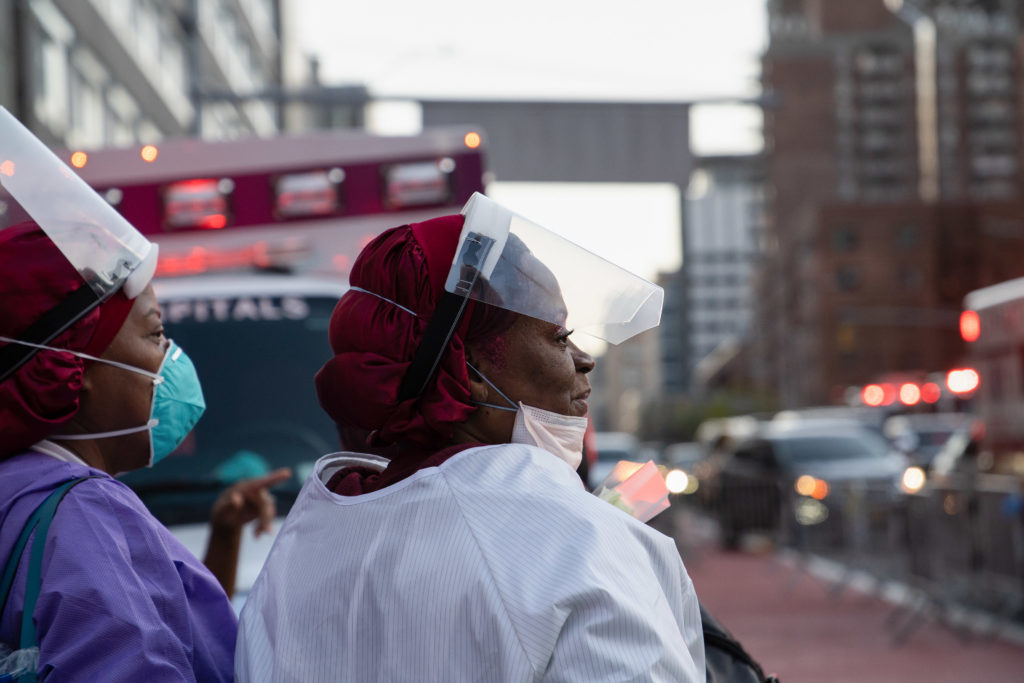End disproportionate impact of COVID-19
WE MUST CREATE a new future where ALL OF US can live in dignity and thrive

The outbreak of COVID-19 is impacting all of us, though some communities are more likely to bear the brunt of an inadequate public health response and face additional challenges in following public health guidance and accessing health care services.
This disparate impact is felt by, but not limited to, communities of color, Indigenous Peoples, people who are experiencing homelessness, housing insecurity, or poverty, people with disabilities, people who are undocumented, migrant workers, people in precarious/insecure employment including in the “gig” economy, people who are incarcerated or held in immigration detention, and people who are working in the informal sector or with lower socio-economic status.

The limited data that is currently available indicates that COVID-19 is disproportionally impacting communities of color:
- According to Louisiana’s governor, as of April 24, black residents in Louisiana account for approximately 33 percent of the state’s population yet represent nearly 60 percent of known COVID-related deaths.
- According to the Chicago Department of Public Health, as of April 29, while black residents represent 30 percent of the city’s population, they account for 54 percent of the city’s known COVID-related deaths and 40 percent of confirmed cases
- In NYC, North Carolina, Michigan, Wisconsin, and Illinois, COVID-19 cases have disproportionately affected communities of color, immigrant communities, and lower-income neighborhoods.
- The situation seems even more dire for some Indigenous communities: as of mid-April, the Navajo Nation’s coronavirus infection and death rates are 10 times higher per capita than their neighboring Arizona.
Socioeconomic factors further contribute to disparities in COVID-19 outcomes. People with lower incomes are more likely to have chronic health conditions that increase the risk for COVID-19 and more serious health outcomes; may be unable to adhere to physical distancing guidelines due to living circumstances or employment as essential and frontline workers or as the family’s sole earner; and have higher rates of underlying medical conditions. In the United States, black and Latinx workers are less likely to be able to work from home or have employment that provide them paid leave, which would allow them to stay home and seek appropriate medical care if they or a family member become ill.
COVID-19 and the U.S.’s public health response has brought these structural inequities into sharp focus. These inequities are compounded with inequality and discrimination to amplify the effects of the outbreak in certain communities.
HUMAN RIGHTS IN THE COVID-19 RESPONSE
An effective and fair U.S. response to the COVID-19 pandemic will incorporate human rights in all aspects of prevention, treatment, and care. A human rights-centered response protects the well-being of all, while explicitly addressing the inequities and inequality, enlarged by a U.S. history of structural discrimination and deficient human rights framework.
The U.S. has signed or ratified human rights treaties requiring it to guarantee the right to health. The right to health includes the prevention, treatment, and control of epidemic diseases, such as COVID-19. There is an obligation to ensure that preventive care, goods, services, and information are available and accessible to all persons.
The U.S. government must fully account for the needs of adversely impacted and marginalized groups and people in its plans and strategies to respond to COVID-19. The government must also plan for groups that have been particularly and disproportionately impacted by the epidemic who may require targeted assistance.
Every person should have a standard of living that can ensure their health, dignity, and well-being as well as that of their family. This includes the human rights to housing, food, water, clothing, education, necessary social services, and the right to security in the event of unemployment, sickness, disability, old age or other lack of livelihood in circumstances beyond their control. The U.S. must also take specific action to end discrimination and stigma, and to protect all individuals from mistreatment.
RECOMMENDATION
As an initial step, Amnesty International calls for a targeted approach to address disparities and inequities through, in part, the creation of equity task forces at the state level in consultation and collaboration with impacted communities. These equity task forces should be adequately funded.
At a minimum these task forces should ensure the following:
- All state and local authorities collect properly anonymized data, to be made public on the impact of COVID-19, disaggregated based on race and ethnicity, religion, gender, gender identity, sexual orientation, Indigenous identity, disability, and socio-economic status. All such data collection must be strictly limited and proportionate to the legitimate aim of addressing disparities in public health, and should not continue longer than necessary to address such aims.
- All state and local authorities collect this data for the number of people tested, number of positive cases, and number of people who have recovered or died as a result of COVID-19. In addition to the general public, this data should be collected and made public for people that are penalized or detained for violation of shelter in place orders, and people in jails and prisons including those that are released from detention. Similarly, this data should be disaggregated based on the aforementioned demographic information.
- All communities have access to public health information and have the ability to follow guidance, including the development of community-based responses, to ensure that communities can follow public guidance, including physical distancing.
- All communities have access to healthcare services that are available, accessible, affordable, and of good quality on the basis of non-discrimination.
- All communities have a safety net that respects, protects, and fulfills economic and social rights including the right to housing, healthcare, and livelihood.
- State and local authority shelter-in-place orders are not selectively or disproportionately enforced, and that alternatives to custodial detention and fines are considered where appropriate.
- Gun violence prevention programs are adequately funded and prioritized given the number of guns that have been purchased in the wake of COVID-19.
- Consider the release of as many people as possible from prisons and jails, and provide appropriate health care and tools of prevention to those who cannot be released.
- All immigrants and asylum-seekers who are detained solely because of their immigration status be released; all families in immigration detention be released together; and full healthcare and protection against COVID-19 provided for those who remain in detention.
